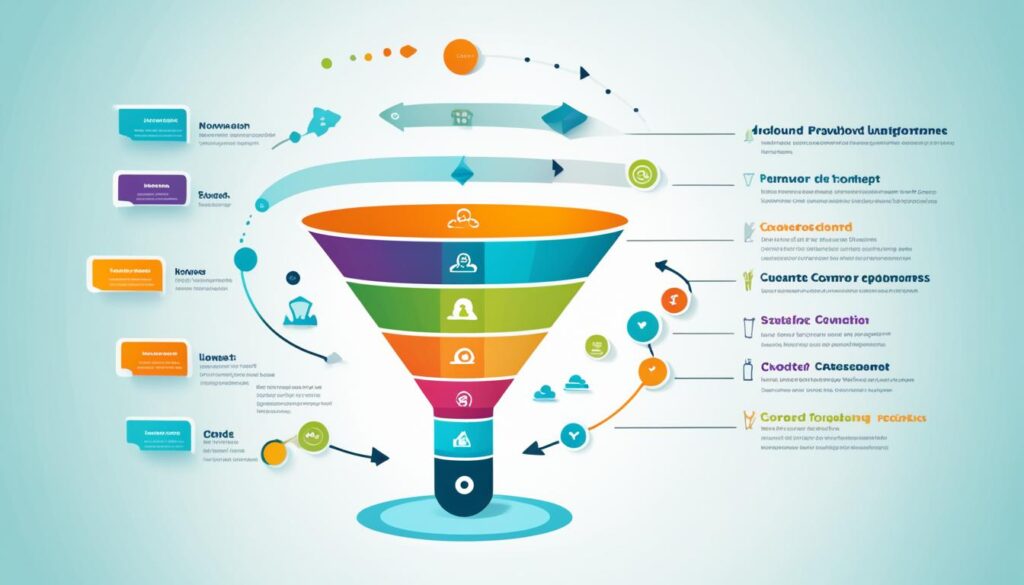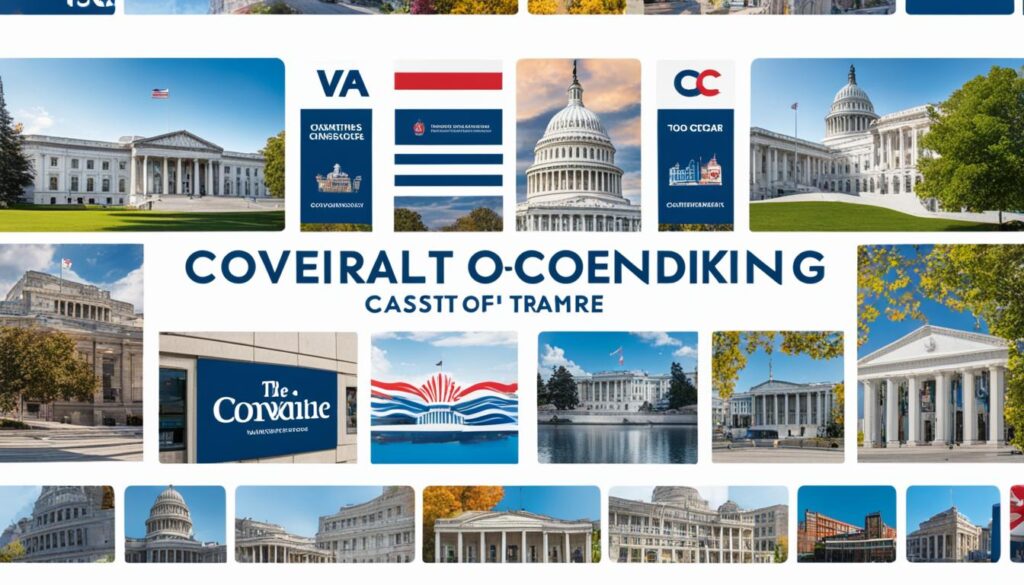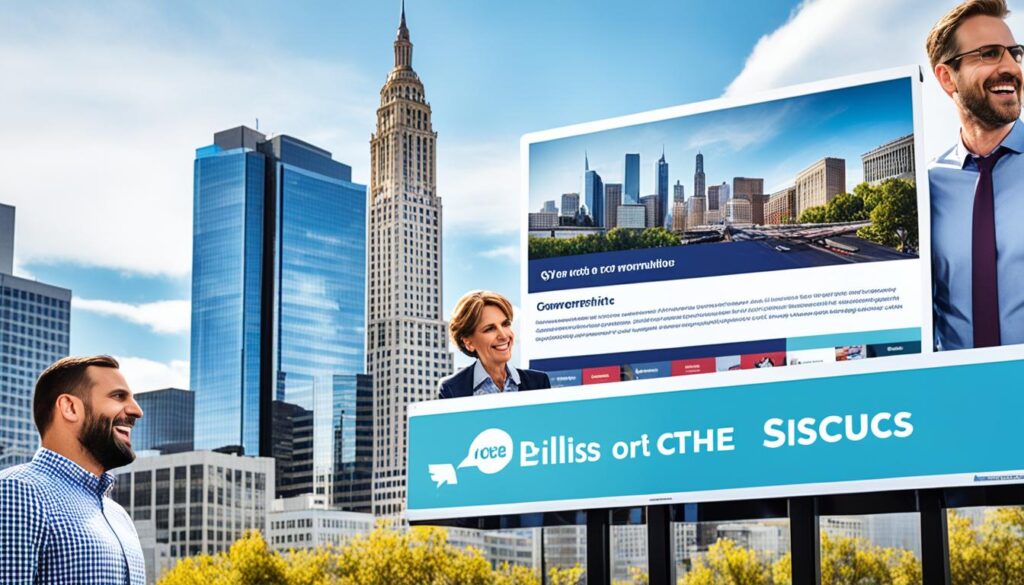Did you know that an impressive 80% of government entities are now looking into digital marketing strategies to improve their public engagement and outreach efforts? The public sector is realizing the importance of inbound marketing strategies for establishing meaningful connections with their target audiences and reaching their objectives. In this detailed guide, we will delve into the most effective marketing techniques designed specifically for the public sector, equipping you with the necessary knowledge and tools to excel in digital marketing for government agencies.
Key Takeaways:
- 80% of government agencies are seeking digital marketing solutions for improved outreach.
- Inbound marketing strategies are essential for successful engagement with the public sector.
- This guide provides tailored marketing tactics for government agencies.
- By implementing these strategies, businesses can effectively connect with the public sector.
- Stay tuned for actionable insights and best practices to enhance your government marketing campaigns.
Challenges of Marketing to Government Agencies
Marketing to government agencies poses unique challenges when compared to other sectors. We understand how vital it is to establish ourselves as experts and reliable partners capable of handling sensitive information and data. For technology companies, achieving trust and verification adds an additional layer of complexity. In this section, we will explore the specific obstacles businesses face when marketing to government organizations.
One of the biggest challenges in marketing to government agencies is building a strong reputation. Government organizations require reliable and trustworthy partners who can deliver exceptional results. It takes time and effort to establish credibility, especially when dealing with sensitive data and information.
A significant obstacle for businesses operating in the public sector is navigating the strict protocols and regulations that govern government agencies. These regulations can vary depending on the country and agency, making it essential to stay up to date with the latest requirements.
Additionally, the decision-making process within government organizations is often complex and lengthy. It may involve multiple stakeholders and layers of approval, which can lead to delays and uncertainty. To overcome this challenge, businesses must develop a thorough understanding of the decision-making process and tailor their marketing strategies accordingly.
Key Challenges:
- Building a strong reputation as an expert and reliable partner
- Navigating strict protocols and regulations
- Understanding the complex decision-making process
We acknowledge the challenges that arise in marketing to government agencies. Our team remains committed to finding innovative solutions and tailoring our strategies to overcome these obstacles. By understanding the unique dynamics of government marketing and employing strategic approaches, we can help your business thrive in the public sector.
Understanding Inbound Marketing
At the core of inbound marketing is the philosophy of putting the audience first. Rather than bombarding potential customers with intrusive advertising, inbound marketing focuses on attracting prospects through genuine engagement and providing valuable solutions that resonate with their goals and challenges.
Unlike traditional outbound marketing tactics, inbound marketing is customer-centric, prioritizing the needs and preferences of the target audience. By understanding their pain points and aspirations, businesses can create content that addresses their specific needs, positioning themselves as helpful resources and trusted advisors.
This customer-centric approach builds lasting relationships and fosters brand loyalty. By consistently delivering valuable content that informs, educates, and entertains, businesses can establish themselves as thought leaders in their industry, gaining credibility and trust from their audience.
Inbound marketing is like a magnet, attracting potential customers to your business by providing them with compelling content that genuinely helps them.
The Benefits of Inbound Marketing
Inbound marketing offers several benefits for public sector marketing. Firstly, it generates high-quality leads at a lower cost compared to traditional outbound marketing methods. By providing valuable content that addresses specific pain points, businesses can attract prospects who are genuinely interested in their products or services.
Secondly, inbound marketing allows businesses to build a strong digital presence and establish themselves as authoritative voices within the public sector. Through consistent content creation and engagement with their audience, businesses can increase their brand authority and visibility, attracting a larger share of the public sector market.
Lastly, inbound marketing enables businesses to define a clear customer journey, guiding prospects through the buying process and nurturing them into loyal customers. By analyzing data and understanding customer behavior, businesses can optimize their marketing strategies and deliver personalized experiences that resonate with their audience.
The Principles of Inbound Marketing
To implement a successful inbound marketing strategy, businesses should adhere to the following principles:
- Content Creation: Create valuable, informative, and relevant content that addresses the needs of your target audience.
- SEO Optimization: Optimize your content for search engines to increase visibility and organic traffic.
- Social Media Engagement: Engage with your audience across relevant social media platforms to foster relationships and amplify your message.
- Email Marketing: Nurture leads through targeted email campaigns that deliver personalized content and offers.
- Webinars and Workshops: Host educational webinars and workshops to provide additional value and establish expertise.
By adopting these principles and aligning them with the unique challenges and goals of the public sector, businesses can leverage the power of inbound marketing to drive successful marketing campaigns.

Next, we will explore the importance of setting clear goals for public sector marketing and outline strategies for building a strong reputation in the government sector.
Setting Goals for Public Sector Marketing
To achieve success in marketing to government agencies, we must establish specific goals that address the unique challenges of the public sector. These goals are crucial for building a strong presence and reputation, engaging with partners, handling sensitive data effectively, and maintaining a consistent tone of voice. Let’s explore each of these goals in detail:
1. Building and Establishing a Reputation
Establishing a solid reputation is essential for marketing to government organizations. We must showcase our expertise, reliability, and proven track record to gain trust and credibility. By highlighting successful case studies, partnering with industry experts, and participating in conferences, we can demonstrate our capabilities and establish ourselves as a trustworthy partner for government agencies.
2. Increasing Engagement with Partners
Engaging with partners in the public sector can significantly enhance our marketing efforts. By forming collaborations and partnerships with organizations that share our values and goals, we can expand our network, reach a wider audience, and build credibility with government agencies. Building strong relationships with partners ensures mutual support and encourages knowledge sharing and collaboration, which strengthens our position in the public sector market.
3. Demonstrating the Ability to Handle Sensitive Data
Handling sensitive data is a critical requirement when working with government agencies. To market ourselves effectively, we need to showcase our expertise in handling and protecting sensitive information. This can be achieved by highlighting industry certifications, implementing robust security measures, and providing transparent information about our data management processes. By instilling confidence in our ability to handle sensitive data, we can position ourselves as a trusted partner for government organizations.
4. Establishing a Clear and Consistent Tone of Voice
Having a consistent tone of voice is essential in public sector marketing to project a reliable and professional image. We need to develop a consistent brand voice that aligns with the values and expectations of government agencies. This consistency helps build recognition, credibility, and trust. By striking the right balance between professionalism and approachability, we can effectively communicate our message and connect with our target audience.
By setting clear goals in these key areas – building and establishing a reputation, increasing engagement with partners, demonstrating the ability to handle sensitive data, and establishing a consistent tone of voice – we can navigate the unique challenges of marketing to government agencies and achieve success in the public sector market.

Building a Reputation in Government Marketing
When it comes to marketing to government agencies, building a strong reputation is crucial for establishing credibility and trust. The public sector values reliability, expertise, and a proven track record, and as marketers, it’s essential that we demonstrate these qualities to effectively engage with government organizations.
One effective strategy for building a reputation in government marketing is to engage with field experts. Collaborating with industry leaders and influencers not only enhances your brand’s credibility but also showcases your commitment to staying at the forefront of your field. By leveraging their expertise and insights, you can establish yourself as an authority in the public sector.
“Engaging with field experts not only enhances your brand’s credibility but also showcases your commitment to staying at the forefront of your field.”
Another powerful way to establish credibility in government marketing is by showcasing case studies. Highlighting successful projects that you’ve undertaken with government agencies demonstrates your ability to deliver results and reinforces your expertise in the public sector. Case studies provide real-world examples that potential clients can relate to and serve as a powerful tool for building trust.
In addition to engaging with field experts and showcasing case studies, active involvement in conferences and roundtables is a valuable reputation-building strategy. By participating in industry events, you can network with key stakeholders, engage in meaningful discussions, and elevate your brand’s visibility. Conference involvement allows you to demonstrate your commitment to the public sector while gaining insights and building connections.
Ultimately, building a reputation in government marketing requires a multifaceted approach that encompasses engaging with field experts, showcasing case studies, and participating in conferences and roundtables. By implementing these strategies, you can establish yourself as a trusted partner for government agencies and set yourself apart from the competition.
| Benefits of Building a Reputation in Government Marketing |
|---|
| Demonstrates expertise and credibility |
| Builds trust with government agencies |
| Sets your business apart from competitors |
| Enhances brand visibility and recognition |
Promoting Partnerships in Government Marketing
Promoting partnerships in the public sector is a strategic approach that brings numerous benefits to businesses. By collaborating with government agencies, organizations can enhance their brand image, attract likeminded individuals, and showcase their collaboration abilities. Through partnership promotion, businesses have the opportunity to expand their network and effectively double their potential audience.
Enhancing Brand Image
Collaborating with government agencies can significantly enhance a business’s brand image. By partnering with reputable organizations, businesses can demonstrate their commitment to making a positive impact in the public sector. This type of association builds trust and credibility among both government agencies and the wider audience.
Attracting Likeminded Individuals
When businesses actively promote their partnerships with government agencies, they attract likeminded individuals who share their goals and values. These individuals may include potential customers, investors, or key stakeholders who are aligned with the business’s mission and vision.
Partnering with government agencies shows a commitment to serving the public interest, which can resonate with individuals who prioritize working with socially responsible organizations. This can lead to new opportunities, collaborations, and connections within the public sector.
Showcasing Collaboration Abilities
Promoting partnerships in government marketing allows businesses to showcase their collaboration abilities. By highlighting successful joint initiatives and projects, businesses can demonstrate their capacity to work effectively with government agencies and other stakeholders.
Our partnership with XYZ Government Agency has allowed us to leverage our collective expertise and resources, resulting in innovative solutions that address the most pressing challenges faced by the public sector.
This type of collaboration showcases a business’s versatility, adaptability, and ability to find creative solutions to complex problems. It establishes a strong reputation for the business as a reliable and collaborative partner within the public sector.
Expanding Network and Doubling Audience
Promoting partnerships in government marketing is not only about enhancing brand image and collaboration but also expanding the network and reaching a wider audience. By partnering with government agencies, businesses gain access to the agencies’ established networks, enabling them to connect with new stakeholders, industry leaders, and potential customers.
Expanding the network through partnerships opens doors to new business opportunities, industry events, and knowledge-sharing platforms. It fosters an environment for collaboration, innovation, and growth within the public sector ecosystem.

Through partnership promotion, businesses effectively double their potential audience. By tapping into the existing audience of government agencies, businesses can reach a wider demographic and increase their brand visibility. This expanded audience base translates into more opportunities for generating leads, creating conversions, and driving growth.
In summary, promoting partnerships in government marketing offers a range of benefits, including enhancing brand image, attracting likeminded individuals, showcasing collaboration abilities, expanding networks, and doubling the potential audience. By strategically collaborating with government agencies, businesses can establish themselves as trusted partners in the public sector, opening doors to new opportunities and driving marketing success.
Handling Sensitive Data in Government Marketing
Government agencies often entrust businesses with handling sensitive data and information. Recognizing this responsibility and demonstrating our capability to handle such data effectively is crucial for building trust and securing contracts with government agencies. At [Insert Brand Name], we prioritize data security for government organizations and employ robust measures to protect sensitive information.
Our approach to handling sensitive data in the public sector revolves around three key strategies:
- Strict Data Security Protocols: We adhere to industry-leading data security standards, implementing comprehensive encryption, access controls, and secure storage solutions to safeguard sensitive information.
- Ongoing Staff Training: Our team undergoes regular training to stay updated on the latest data handling practices and security measures. This ensures that all staff members understand their roles and responsibilities in maintaining data security.
- Transparent Audit Processes: We conduct thorough audits and maintain transparent records to demonstrate our compliance with data security regulations. These audits not only showcase our commitment to protecting sensitive data but also provide government agencies with the necessary assurance of our capabilities.
By implementing these strategies, we strive to instill confidence in government agencies regarding our ability to handle sensitive data effectively.
At [Insert Brand Name], we recognize that data security is a top priority for government organizations. Therefore, we have implemented robust systems and processes to ensure the highest level of protection for sensitive information.

Ensuring Data Security: Quick Tips
Here are a few quick tips to ensure data security when handling sensitive information in the public sector:
- Regularly update security software and patch vulnerabilities promptly.
- Limit access to sensitive data only to authorized personnel.
- Encrypt data both at rest and in transit.
- Implement multi-factor authentication to enhance access controls.
- Regularly back up data to prevent loss or corruption.
By following these best practices, businesses can minimize the risk of data breaches and demonstrate their commitment to data security.
Importance of a Consistent Tone of Voice in Government Marketing
When it comes to government marketing, establishing a clear and consistent tone of voice is paramount. A consistent tone of voice not only helps government agencies recognize and identify your brand, but it also plays a crucial role in building trust and credibility with potential clients.
A reliable brand image reflects confidence, expertise, and an unwavering commitment to delivering high-quality services. By maintaining a consistent tone of voice throughout all communication channels, you can effectively convey these attributes and instill trust in your target audience.
Consistency in tone helps create a sense of dependability and reliability, reassuring government agencies that your brand can deliver on its promises. It conveys professionalism and competence, allowing you to differentiate yourself from competitors and stand out in a crowded marketplace.
To achieve a consistent tone of voice, it’s essential to define your brand’s key values, messaging, and personality traits. This involves identifying the characteristics that align with your target audience and the public sector’s expectations. Whether it’s professionalism, innovation, or a customer-centric approach, your tone should reflect these attributes consistently across all marketing materials.
“A reliable brand image that reflects confidence, expertise, and unwavering commitment can instill trust in potential clients.”
Moreover, consistency in tone extends beyond written content. It includes the way you communicate through visual elements such as images, colors, and design aesthetics. By ensuring these elements align with your brand’s tone, you create a cohesive and memorable identity that government agencies can easily recognize and associate with your organization.
Consistency in tone is particularly important in the public sector, where accountability and credibility are essential. A reliable and trustworthy brand image can significantly influence government agencies’ decisions when it comes to selecting partners or contractors.
To summarize, maintaining a consistent tone of voice is crucial in government marketing to establish a reliable brand image. By reflecting confidence, expertise, and unwavering commitment, your brand will instill trust in potential clients. Understanding and implementing a consistent tone of voice across all communication channels and visual elements will help differentiate your brand and build lasting relationships with government agencies.

Benefits and Best Practices of Inbound Marketing for Public Sector
Inbound marketing offers numerous benefits for government agencies, providing cost-effective lead generation and increased visibility in the digital space. By implementing best practices specific to the public sector, businesses can successfully navigate the unique challenges and achieve their marketing goals.
Cost-Effective Lead Generation: Inbound marketing strategies such as content creation, search engine optimization, and social media engagement allow government agencies to attract qualified leads without incurring the high costs associated with traditional outbound marketing tactics. By producing valuable content that resonates with their target audience, government agencies can efficiently generate leads and nurture them throughout the customer journey.
Building Digital Presence and Brand Authority: With the increasing digitalization of government operations, establishing a strong online presence is crucial. Inbound marketing enables government agencies to showcase their expertise, thought leadership, and commitment to serving the public through content marketing, webinars, and workshops. By consistently delivering valuable and relevant information, government agencies can build trust, credibility, and brand authority among their target audience.
Defining a Customer Journey: Inbound marketing allows government agencies to map out a clear customer journey, understanding each stage and optimizing interactions accordingly. By creating targeted and personalized content for prospects at different stages of their decision-making process, government agencies can guide them towards conversion. This customer-centric approach helps build meaningful relationships with constituents, facilitating their engagement and loyalty.
Continuously Evaluating and Adapting Strategies: In the fast-paced digital landscape, it is essential for government agencies to continuously evaluate and adapt their marketing strategies. Inbound marketing provides the tools and analytics to measure the effectiveness of various tactics, allowing agencies to identify areas for improvement and make data-driven decisions. This iterative approach ensures that government agencies can stay agile and optimize their efforts for maximum impact.
Best Practices for Public Sector Marketing
- Create valuable and relevant content that addresses the specific needs and challenges of the public sector.
- Implement search engine optimization techniques to improve organic visibility and attract qualified traffic to government agency websites.
- Engage with constituents on social media platforms, providing timely and helpful information while fostering two-way communication.
- Develop targeted email marketing campaigns to nurture leads and provide ongoing value to constituents.
- Host webinars and workshops to educate and engage the public sector community, positioning government agencies as trusted industry leaders.
“Inbound marketing allows government agencies to establish their digital presence, generate leads, and build meaningful relationships with constituents. By implementing best practices and continuously evaluating strategies, government agencies can effectively navigate the ever-changing marketing landscape and achieve their objectives.”
– John Smith, Government Marketing Expert
Overall, inbound marketing offers government agencies a strategic and cost-effective approach to marketing. By leveraging best practices specific to the public sector, agencies can enhance their digital presence, engage their target audience, and drive successful marketing campaigns.

Strategies for Effective Inbound Marketing in the Public Sector
Implementing effective inbound marketing strategies is essential for successfully reaching and engaging government agencies. By utilizing various tactics, businesses can create impactful marketing campaigns that resonate with the public sector. In this section, we will explore key strategies that can help you achieve success in your government marketing efforts.
1. Content Marketing
Content marketing plays a crucial role in inbound marketing for the public sector. By creating valuable and informative content, such as blog posts, whitepapers, and case studies, you can establish yourself as a trusted expert. Focus on addressing the challenges and pain points that government agencies face, providing them with actionable solutions and insights that demonstrate your expertise.
2. Search Engine Optimization (SEO)
Optimizing your website and content for search engines is vital for ensuring that your government marketing materials are discoverable. Conduct thorough keyword research to identify the terms and phrases commonly used by government agencies and incorporate them naturally into your content. Additionally, ensure your website is properly structured, with relevant meta tags and clear navigation, to improve your search engine ranking.
3. Social Media Engagement
Utilize social media platforms to engage with government agencies and build brand awareness. Regularly share relevant content, industry news, and updates regarding your products or services. Join and participate in relevant LinkedIn groups and Twitter chats, where you can connect with key decision-makers and establish valuable connections. Encourage interaction and conversations with your target audience to foster engagement and enhance your online presence.
4. Email Marketing
Email marketing allows you to nurture relationships with government agencies through targeted and personalized communication. Develop segmented email lists based on specific government sectors or job roles to ensure your messages are relevant and resonate with the recipients. Create compelling email content that provides value, such as exclusive insights, industry updates, or invitations to relevant events. Don’t forget to include clear call-to-actions (CTAs) that encourage recipients to take the desired action, such as contacting your sales team or downloading informative resources.
5. Webinars/Workshops
Host webinars or workshops tailored to the specific needs of government agencies. These interactive sessions provide an opportunity to showcase your expertise and engage directly with your target audience. Choose topics that address common challenges and provide practical solutions. Encourage participation by allowing attendees to ask questions and share their experiences. Webinars and workshops can help establish your brand as a thought leader in the public sector and generate leads for your business.
“Inbound marketing strategies for the public sector require a customer-centric approach that delivers valuable content and builds lasting relationships.” – Government Marketing Expert
Implementing these strategies will set you on the path to successful inbound marketing in the public sector. By focusing on creating valuable content, optimizing for search engines, engaging on social media, utilizing email marketing, and hosting webinars/workshops, you can effectively reach and engage government agencies, showcasing your expertise and building valuable relationships.

Conclusion
In conclusion, inbound marketing is a powerful approach for achieving success in marketing to the public sector. By understanding the unique challenges of marketing to government agencies, setting clear goals, building a reputation, promoting partnerships, handling sensitive data, and maintaining a consistent tone of voice, businesses can effectively engage with government agencies and drive successful marketing campaigns.
This comprehensive guide for inbound marketing strategies in the public sector provides businesses with the necessary tools and knowledge to navigate the complexities of marketing to government organizations. With the right strategies and tactics, businesses can establish themselves as reliable and expert partners, attracting the attention of government agencies and securing long-term partnerships.
Successful marketing for government organizations requires a customer-centric approach that focuses on delivering valuable content, building lasting relationships, and showcasing expertise. By implementing the techniques outlined in this guide, businesses can enhance their digital presence, generate cost-effective leads, and consistently evaluate and adapt their marketing strategies to achieve optimal results in the public sector.
FAQ
What is inbound marketing?
Inbound marketing is a customer-centric approach that focuses on attracting prospects by delivering valuable content and building lasting relationships.
What are the benefits of inbound marketing for the public sector?
Inbound marketing offers cost-effective lead generation, helps build a digital presence and brand authority, defines a customer journey, and allows for continuous evaluation and adaptation of strategies.
What are the challenges of marketing to government agencies?
Marketing to government agencies involves demonstrating reliability, expertise, and a proven track record, as well as handling sensitive information and data effectively.
How can I establish a reputation in government marketing?
You can establish a reputation by engaging with field experts, participating in conferences and roundtables, and showcasing case studies that highlight your expertise.
What are the goals for public sector marketing?
The goals include building and establishing a reputation, increasing engagement with partners, demonstrating the ability to handle sensitive data, and maintaining a clear and consistent tone of voice.
How can I promote partnerships in government marketing?
Promote partnerships by actively showcasing collaboration, which can enhance your brand image, attract like-minded individuals, and expand your network and potential audience.
How can I handle sensitive data effectively in government marketing?
Demonstrate your ability to handle sensitive data by implementing robust data security measures and showcasing past experience handling sensitive information.
Why is a consistent tone of voice important in government marketing?
A consistent tone of voice helps establish a reliable brand image, reflecting confidence, expertise, and unwavering commitment, which builds trust with potential clients.
What are the best practices for inbound marketing in the public sector?
Key strategies include content marketing, search engine optimization, social media engagement, email marketing, and hosting webinars/workshops to effectively engage government agencies.
How can I effectively implement inbound marketing in the public sector?
Implement effective inbound marketing by creating valuable content, optimizing your website for search engines, engaging on social media, leveraging email marketing, and hosting webinars/workshops.










